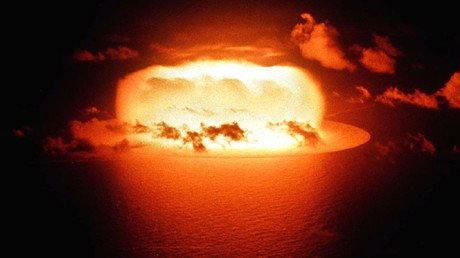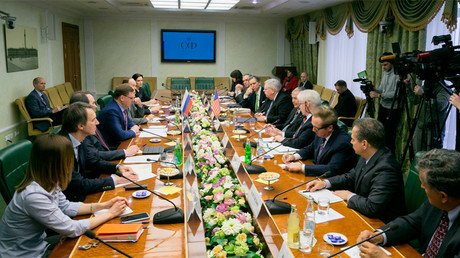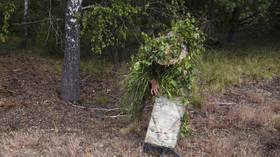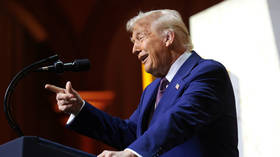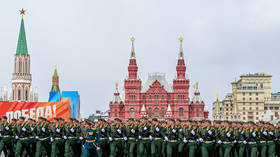Pentagon chief seeks reforms, calls Russia ‘No. 1 strategic threat’
Seeking to make the US military more efficient and better coordinated in the face of “strategic threat” from Russia, Secretary of Defense Ash Carter is looking for “practical updates” to the Pentagon’s organizational framework established in the 1970s.
READ MORE: Russia vows ‘totally asymmetrical’ response to major US troop build-up in Europe
Speaking at the Center for Strategic and International Studies (CSIS) in Washington, DC, Carter said the reforms were necessary to make the US military more “agile” and able to address the five strategic challenges, which he named as “Russia, China, North Korea, Iran and terrorism.”
The current organization of the US military, from the territorial organization of Combatant Commands to the role of the Chairman of the Joint Chiefs of Staff outside the chain of command, is a product of the Goldwater-Nichols Department of Defense Reorganization Act, signed into law in October 1986.
While the 1986 reform was driven by the lessons of Vietnam and the botched 'Desert One' hostage rescue in Iran, Carter said the updates were not driven by failure.
“I am deeply proud of how our people operated in Iraq and Afghanistan over the 15 years,” he said.
The changes, proposed by the Pentagon’s Deputy Chief Management Officer Peter Levine and Joint Staff Lieutenant-General Thomas Waldhauser after a months-long review, seek to give the Chairman of the Joint Chiefs of Staff (CJCS) more authority to advise and coordinate between different services and commands, make the commands more efficient, and improve the acquisition process, among other things.
“Over the coming weeks, we will execute some of these decisions under our own existing authority,” said the Defense Secretary, adding that others may require legislative action.
The reforms envision expanding the authority of the CJCS to “help synchronize resources globally for daily operations around the world,” coordinating forces across the seams of combatant commands; provide military advice for current operations, not just future planning; and to advise the Secretary of Defense on military strategy and operational plans, taking into consideration possible “overlapping contingencies.”
Carter defended keeping the CJCS outside the chain of command, arguing this would ensure preserving his integrity as the principal military adviser to the civilian authorities.
Redundancies between the Combat Commands will be eliminated by integrating some of their functions at the Joint Staff level, Carter said. The DOD is committed to reducing headquarters management by 25 percent, while pouring $35 billion into Cyber Command over the next five years.
To ensure the service chiefs are more involved in the acquisition process, the reforms would give them a seat on the acquisition board. With the greater responsibility will come increased accountability, Carter warned.
“The chiefs themselves, and their military staffs, will need to sharpen this skillset, which in places has atrophied over the years, to be successful in discharging their new acquisition responsibilities,” he said.
‘Russia a threat to US world hegemony concept’
Gerry Sussman, professor of Urban Studies and Planning at Portland State University, explained to RT that Russia, just as the Soviet Union in the past, has become a “unifying theme” for US foreign policy strategists, allowing them to put together “a very disunified foreign policy around a common target.”
Without a coherent foreign policy strategy and with a lack of leadership on behalf of the current US president, Russia “serves as a unifying force to build a kind of a new Cold-War consensus to give some semblance of direction to American foreign policy where there really isn’t any.”
“The US has actually lost quite a bit of power over the years in the Middle East and Eastern Europe, and I think it’s just a way of creating an old boogeyman in the person of President [Vladimir] Putin and in Russia itself,” he argued, adding that to make matters worse, various US defense and intelligence agencies are in “disarray” over policy making.
The disproportionate attention given by the US media to Putin in connection with the Panama Papers leak – despite the fact that his name was not even mentioned in the batch – is the latest example of Russia’s demonization, according to Sussman.
“The main focus was on President Putin rather than some of the American allies, including Mr Poroshenko in Ukraine, who has been actually listed,” he said.
Responding to the question of what threat Russia could possibly present to the USA, the expert said that Moscow poses “a threat to American global interests…to its hegemony around the world” by challenging Washington’s concept of “hegemonic power that seeks global domination.”
While US talks terrorism at nuke summit, Russia fights it in Syria (Op-Edge by @JohnWight1) https://t.co/vlWVySFjs8pic.twitter.com/Tn0mNWMYOX
— RT (@RT_com) April 2, 2016
It’s not by accident that terrorism was last on the Pentagon’s list of threats, Sussman said, calling it an “instrumental threat” which, however acute at the moment, is not much of a danger to the American superpower concept – unlike Russia and China.
Since Russia started playing the central role in fighting Islamic State (IS, formerly ISIS/ISIL) in Syria, the Syrian Army has achieved major advances supported by the Russian Air Force, including the recent liberation of Palmyra. Such conduct, according to Sussman, directly interferes with the US image as the main anti-terror warrior and undermines its long-term interest of undisputed global power.
